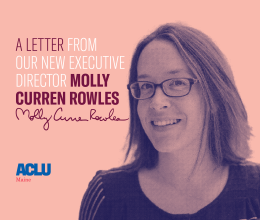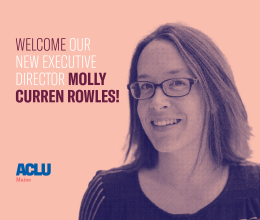LD 2075 may be well-intentioned, but it would lead to the forcible testing of some patients for HIV. This would threaten those patients' privacy, perpetuate stigma, and ignore the standards of care to treat health care providers who may have been exposed to the virus.
History of HIV/AIDS Discrimination:
Since the first AIDS report in 1981 from the U.S. Centers for Disease Control and Prevention, our response as a country to HIV has often been filled with fear, stigmatization, and inaction. Biased assessments of who is most likely to contract HIV and how they are likely to contract the virus (predominantly men who have sex with other men and people who use drugs intravenously) have colored our collective response to the disease, which has disproportionately harmed Black people, other people of color, and transgender people. This discriminatory and fear-based policy making has increased the risk of infection for the already marginalized communities.
As far as we have come from the science and attitudes of 1981, HIV remains a disease that is stigmatized by medical professionals and society at large. It is in part the stigma surrounding an HIV diagnosis that has led us to legally require informed consent before testing. And, in Maine, where everyone knows everyone, the chances of others in the community learning one's health status is great, and the chance of experiencing stigma is more acute.
How LD 2075 Perpetuates Stigma and Goes Against Science:
LD 2075 would allow health care institutions to test a patient without their consent if the patient is incapacitated and a health care worker may have been exposed to that patient's bodily fluids.
As medical professionals testified to legislators, the best course of action to protect a medical professional when they are potentially exposed to HIV is to immediately begin post-exposure prophylaxis drugs (PEP), regardless of whether the patient tests positive. This is the best course of treatment because it can take up to 90 days after contracting HIV before a test reveals that a person is positive. Additionally, HIV tests can return false negatives that would leave health care workers untreated while still subjecting patients to medical testing without their consent.
LD 2075 is a solution in search of a problem that would most harm the very communities that have already endured decades of stigma and discrimination.
Bill Movement:
This bill originated at the end of 2023, moving into the Second Regular Session of the 131st Legislature.
- Bill printed: 12/22/2023
- Referred to Joint Standing Committee on Health Coverage, Insurance and Financial Services: 12/20/2023
- Public hearing in committee: 1/11/24
- Work session and vote in committee: 2/14/23 (DIVIDED REPORT)
- Ought not to pass: 6
- Ought to pass as amended: 5
- House vote: N/A
- Senate vote: N/A
- Action by governor: N/A








